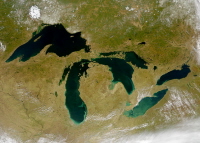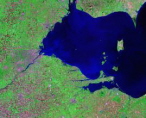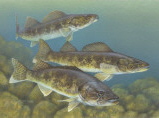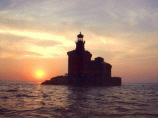Keep Great Lakes Water in the Great Lakes Watershed
Water is the oil of the future.
The Great Lakes COMPACT is the legislation needed to keep other states and countries from getting Great Lakes water.
Ohio has yet to approve the COMPACT and recent comments by LT. Gov. Lee Fisher advocating keeping open the option of selling water in the future is wrong for the economy of Ohio and the Great Lakes and wrong for the protecting 95% of the fresh surface water in the U.S.
About The Great Lakes: Our Great Resource
If the shorelines of the Great Lakes were stretched out, they would reach halfway around the Earth. These great lakes, more like inland seas, contain 95% of the surface fresh water of the United States and 20% of the world's.
Lake Superior, as the name implies, is the biggest. It is larger than even the State of South Carolina! At an average depth of 435 feet, and a maximum depth of 1,332 feet, it is also the deepest.
Lake Michigan is unique by being the only of the 5 located entirely within the United States of America. The great cities of Milwaukee, Wisconsin, and Chicago, Illinois, flourish beside this great lake.
Lake Huron, the second-largest in area, is notable for its Manitoulin Island. This is the world's largest freshwater island.
Our Lake Erie is the warmest, shallowest, and most biologically productive. Its average depth is 62 feet, with the average depth of the western basin at only 24 feet, and while the deepest point of Lake Erie is 210 feet, it is the only lake whose floor is above sea level.
Lake Ontario is the second-smallest in volume and smallest in area. Residing beyond Niagara Falls, it also has the lowest elevation at only 243 feet above sea level.
These lakes provide drinking water for over 40 million people. In addition to water and island tourism, fishing on the Great Lakes is a $4 billion a year industry. Please help save the Great Lakes, our great resource, from environmental disaster.
For an informative pdf on the Great Lakes Water Balance, click here.
The ATSDR has released a public comment draft of a 2008 revision of the "Selected Information on Chemical Releases within Great Lakes Counties Containing Areas of Concern (AOC)." Click here to read the draft.

Western Lake Erie Waterkeeper Association
Western Lake Erie: The Warmest, Shallowest, "Fishiest" Area of the Great Lakes
To learn more about the Waterkeeper Alliance, click here.





~ Currents ~
Visit these sites, take action, and save the Great Lakes!
For your daily dose of Great Lakes news, click here.